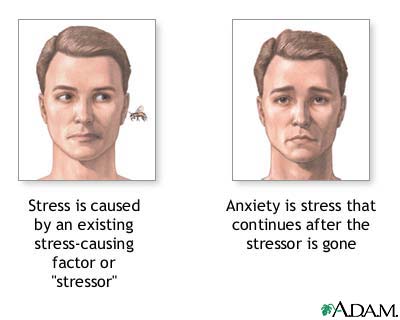Stress is a feeling of emotional or physical tension. It can come from any event or thought that makes you feel frustrated, angry, or nervous.
Stress is your body's reaction to a challenge or demand. In short bursts, stress can be positive, such as when it helps you avoid danger or meet a deadline. But when stress lasts for a long time, it may harm your health.

Considerations
Stress is a normal feeling. There are two main types of stress:
- Acute stress. This is short-term stress that goes away quickly. You feel it when you slam on the brakes, have a fight with your partner, or ski down a steep slope. It helps you manage dangerous situations. It also occurs when you do something new or exciting. All people have acute stress at one time or another.
- Chronic stress. This is stress that lasts for a longer period of time. You may have chronic stress if you have money problems, an unhappy marriage, trouble at work, or significant health concerns. Any type of stress that goes on for weeks or months is chronic stress. You can become so used to chronic stress that you don't realize it is a problem. If you don't find ways to manage stress, it may lead to health problems.
STRESS AND YOUR BODY
Your body reacts to stress by releasing hormones. These hormones make your brain more alert, cause your muscles to tense, and increase your pulse. In the short term, these reactions are good because they can help you handle the situation causing stress. This is your body's way of protecting itself.
When you have chronic stress, your body stays alert, even though there is no danger. Over time, this puts you at risk for health problems, including:
- High blood pressure
- Heart disease
- Diabetes
- Obesity
- Depression or anxiety
- Skin problems, such as acne or eczema
- Menstrual problems
If you already have a health condition, chronic stress can make it worse.
SIGNS OF TOO MUCH STRESS
Stress can cause many types of physical and emotional symptoms. Sometimes, you may not realize these symptoms are caused by stress. Here are some signs that stress may be affecting you:
Causes
The causes of stress are different for each person. You can have stress from good challenges as well as bad ones. Some common sources of stress include:
- Getting married or divorced
- Starting a new job
- The death of a spouse or close family member
- Getting laid off
- Retiring
- Having a baby
- Money problems
- Moving
- Having a serious illness
- Problems at work
- Problems at home

When to Contact a Medical Professional
Contact your health care provider if you feel overwhelmed by stress, or if it is affecting your health. Also contact your provider if you notice new or unusual symptoms.
Reasons you may want to seek help are:
- You have feelings of panic, such as dizziness, rapid breathing, or a racing heartbeat.
- You are unable to work or function at home or at your job.
- You have fears that you cannot control.
- You are having memories of a traumatic event.
Your provider may refer you to a mental health provider. You can talk to this professional about your feelings, what seems to make your stress better or worse, and why you think you are having this problem. You may also work on developing ways to reduce stress in your life.
If you or someone you know is thinking about suicide, call or text 988 or chat 988lifeline.org. You can also call 1-800-273-8255 (1-800-273-TALK). The 988 Suicide and Crisis Lifeline provides free and confidential support 24/7, anytime day or night.
You can also call 911 or the local emergency number or go to the hospital emergency room. DO NOT delay.
If someone you know has attempted suicide, call 911 or the local emergency number right away. DO NOT leave the person alone, even after you have called for help.
Alternative Names
Anxiety; Feeling uptight; Stress; Tension; Jitters; Apprehension
References
Ahmed SM, Hershberger PJ, Lemkau JP. Psychosocial influences on health. In: Rakel RE, Rakel DP, eds. Textbook of Family Medicine. 9th ed. Philadelphia, PA: Elsevier; 2016:chap 3.
Freedland KE, Carney RM, Lenze EJ, Rich MW. Psychiatric and psychosocial aspects of cardiovascular disease. In: Libby P, Bonow RO, Mann DL, Tomaselli GF, Bhatt DL, Solomon SD, eds. Braunwald's Heart Disease: A Textbook of Cardiovascular Medicine. 12th ed. Philadelphia, PA: Elsevier; 2022:chap 99.
National Institute of Mental Health website. I'm so stressed out! Fact sheet. www.nimh.nih.gov/health/publications/so-stressed-out-fact-sheet. Accessed June 4, 2024.
Test Your Knowledge
Review Date 5/4/2024
Updated by: Fred K. Berger, MD, addiction and forensic psychiatrist, Scripps Memorial Hospital, La Jolla, CA. Also reviewed by David C. Dugdale, MD, Medical Director, Brenda Conaway, Editorial Director, and the A.D.A.M. Editorial team.




